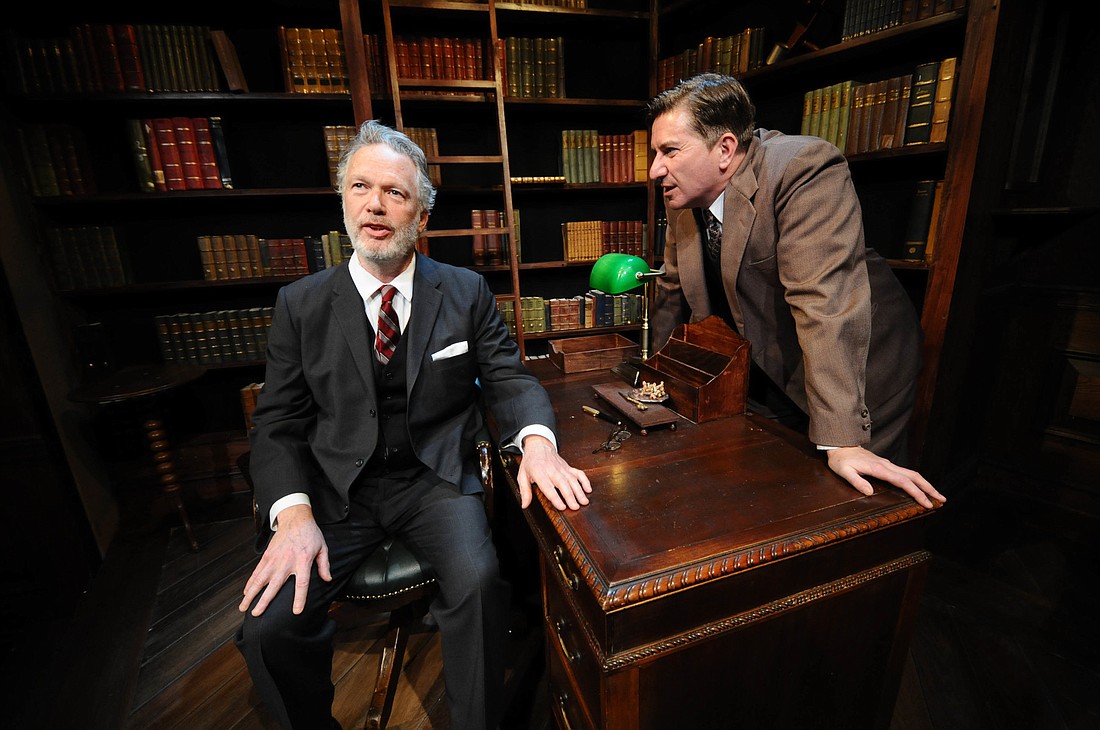- July 9, 2025
-
-
Loading

Loading

Mark St. Germain’s “Freud’s Last Session” imagines a battle of wits by two of the greatest minds of the 20th century: Sigmund Freud (George Tynan Crowley) and C.S. Lewis (Jeffrey Plunkett). Debate is now in session at Florida Studio Theatre.
The conceit? At the dawn of World War II, Freud invites Lewis to his office in London. Therapy isn’t the goal; intellectual debate worthy of “Firing Line” is. Lewis advocates for God’s existence. Freud takes the opposing position.
Lewis, the famed Christian apologist, has three main arguments. 1. Conscience itself: The universal awareness of a moral law implies a transcendent moral lawgiver. We wouldn’t know a crooked line without the idea of a straight line. It’s a crooked world. Where did our idea of goodness come from? 2. The human need for God: As the thirst for water implies water’s existence, the thirst for God implies the existence of its object. 3. Joy: As a child, the sight of a miniature garden in a biscuit tin gave Lewis an out-of-this-world experience of joy. It’s the “joy unspeakable” of the Bible, but also (as Lewis said explicitly) the joy of the romantic poets. Ironically, it’s the “freud” in Friedrich Schiller’s “Ode to Joy.”
To, Freud, the materialist atheist, this was all wishful thinking. Desire is all, and all desire is sexual. Our deepest self is a lawless ball of libido (personified forever for science fiction fans as The Monster from the Id from “Forbidden Planet”). To disguise and control this monster, discontented civilization has created social and family structures, moral codes, religions (C.S. Lewis’ brand included) and other defense mechanisms. Repression is necessary, yes. But let us face facts. The ugliness of the truth is no argument against it. Unicorns and God may be pretty, but that also is no argument for their existence. The psychological basis for Lewis’ belief system is painfully obvious.
Director Kate Alexander presents their confrontation with pitch-perfect tone. Freud and Lewis are civilized, sophisticated intellectuals with good manners. They lose their tempers at times. But this isn’t a WWF shouting match. Crowley’s Freud is nuanced and witty, not a cartoon caricature. Plunkett’s Lewis is a fellow you’d like to have a pint with, not a moralizing prig.
You won’t find any straw men in St. Germain’s play. Freud and Lewis are evenly matched, and their ideas are given equal weight. But men of ideas are also men, not disembodied intellects. And “Freud’s Last Session” is more than an intellectual exercise. Like it or not, the two mental giants are both facing last things — and reacting in an all-too-human way.
The play’s action unfolds Sept. 1, 1939. As tense radio bulletins remind the two men, Hitler just invaded Poland — and a second world war can’t be far behind. Impending doom eats away at their Socratic discussion. When the alert siren sounds a false alarm, both psychoanalyst and Christian apologist rush for their gas masks in a blind panic. Lewis, we discover, is a veteran of World War I, who suffers from PTSD. Freud has his own reasons to fear. We discover that inoperable oral cancer has eaten away his upper palate. The good doctor’s prosthesis is bloody agony. He’s done for, and thinking of taking an early exit. To add to Freud’s pain, he’s lost most of his family in a series of random tragedies — and barely escaped losing his daughter to Hitler. Which puts the big question on the table … Why is there evil and suffering in this world?
Monotheistic theology offers two main answers. Either it’s all part of God’s inscrutable, predestined plan, Satan, Hitler, Charlie Manson included; or God gave the gift of free will, knowing that Satan, Hitler and Charlie Manson would be the cost. These answers boil down to no answer. Have faith. That’s it. Beyond that, rational explanation is impossible. As a philosopher once said, "God wasn’t pulling rank on Job." He was telling Job, “You don’t have the math.” That’s cold comfort for a man who’s lost most of his family and living in constant torture. Lewis knows it, but faith is the only answer he has.
The play raises the ultimate questions. It leaves you to find our own answers — and never telegraphs which side the playwright takes. You’ll be thinking about it long after the actors take their bows.
Ultimate questions are like that.
IF YOU GO
“Freud’s Last Session” has been extended through April 5 at Florida Studio Theatre’s Keating Theatre, 1247 First St., Sarasota. Call 366-9000 or visit floridastudiotheatre.org for more information.